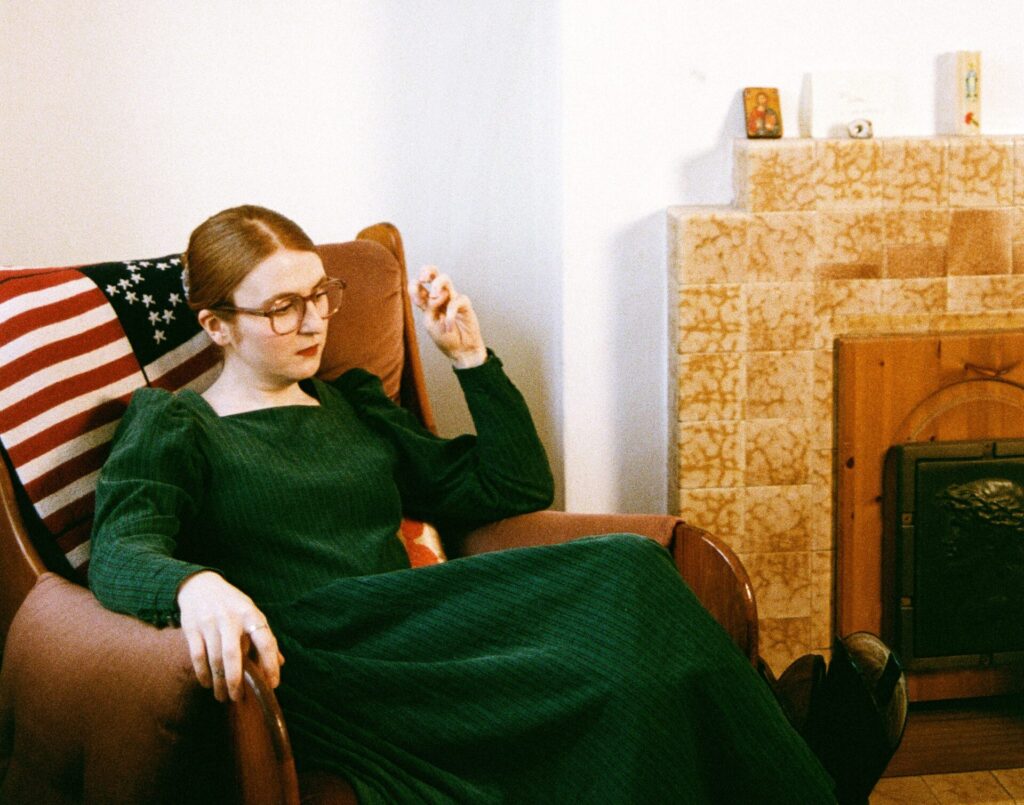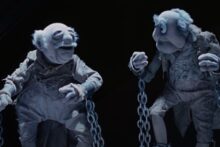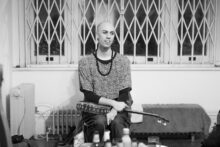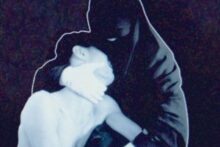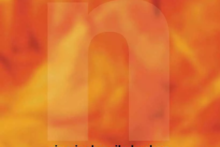On the cover of Jennifer Walton’s album Daughters lays a severed plait, tied with a bow and perched on a satin cushion. “In the midst of grief, I got the worst haircut of my life,” explains the Sunderland-born musician, now based in London, whose record deals with the recent death of her father. “It was kind of like a bob with long bits, just awful. So I cut it off myself and kept it because I knew it would come in handy, which it did. I think your own objects can end up haunting you.” Somehow this eerie but beguiling image encapsulates the album’s essence: surreal but rooted in the familiar, and heavy with the presence of grief.
Although she’s been making music since she was 12, and doing so professionally since 2011, Daughters is the debut solo album from Walton, now aged 30. It represents a break from the club-focused sounds of her earlier output into a singer-songwriter mould, albeit one that still incorporates electronic techniques. “I came into club music through people writing in song form, but electronically, like Nine Inch Nails and Crystal Castles,” says Walton, who has credits on releases by Iceboy Violet and caroline, as well as her projects Cryalot with Sarah Bonito and Microplastics with aya and 96 Back. “I’d always aimed to do a bigger thing, but because I was always making music for other people, I’d write slowly for myself. Now I’ve been able to find time to lean into it properly.” Walton’s voice and guitar are the heart of the record, but the whole thing buzzes with static electricity and broken beats. Her chopped-up production applies deconstructed club forms to melancholy rock music, reminiscent of the broken electronics of Bright Eyes’ Digital Ash In A Digital Urn.
The album started taking shape in 2022, shortly before her father, fellow musician Nigel Walton, passed away. “My dad used to live in Brockley, and my studio was in the guest bedroom there,” she says of the place where the songs took shape, left otherwise empty when her father moved to Devon after getting ill. “The songs I was writing really embodied the time and the space. [Writing] was processing how it had affected me and my body.” At the time of her father’s death, the songs were in their earliest stages; existing as short loops and sounds with no vocals. “They just existed as Ableton files called ‘nice loop’ or ‘weird perpetual loop’ before they transformed into songs,” she laughs. “I started adding lyrics in late 2023 and it happened really, really quickly, which was unusual. I was really shocked that that was my music. And I still feel this in a way: it happened so quickly that they feel kind of separate from me.”
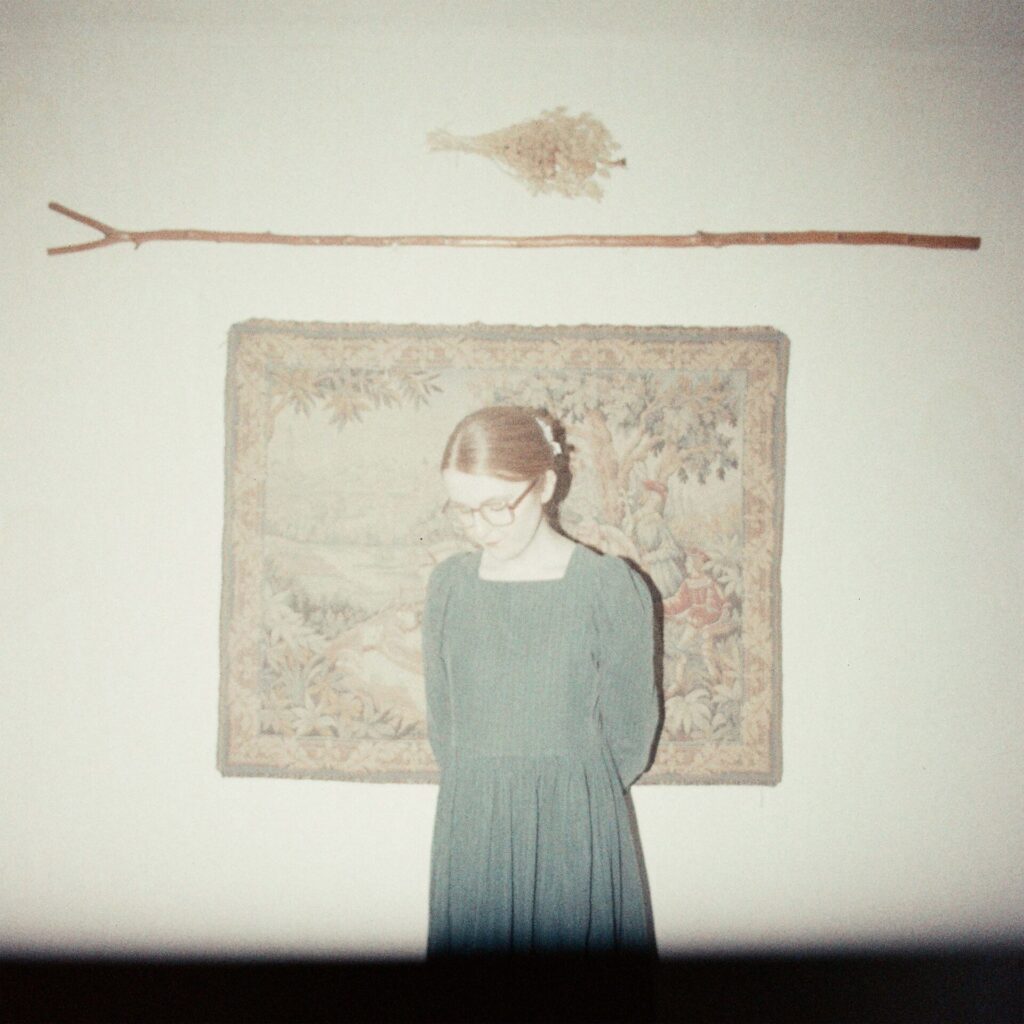
But Daughters isn’t a straightforward grief album. Among the “many other threads that led into it” – burnout, chronic pain, a desire to move away from club music – is a fascination with Americana. Like many British millennials and zoomers, Walton grew up “worshipping” American culture. “Now you hear way more kids who have American accents because of YouTube,” she explains, “but I think I was part of the first generation of that: playing so much Xbox Live and talking to Americans all the time that I almost had an accent when I was at school. In the UK there’s this back and forth, but it’s kind of one sided. We’re engaging with so much American stuff, but I think all of these aesthetics can be more romanticised by someone from the outside.” The album’s promotional photographs articulate this strange cultural exchange, as Walton sits in a pointedly English front room with a star-spangled banner-cum-blanket folded neatly over an armchair.
Walton’s juvenile fascinations came to fruition in 2018, when she got the chance to tour North America playing drums with the peppy indie pop group Kero Kero Bonito. “It was the first time I’ve ever been,” she says. “The whole place is like fiction. LA is obviously the cultural capital, but I hadn’t really understood that just off the Walk of Fame is the most insane poverty and homelessness situation I had ever experienced. Seeing dreams and culture, then seeing people in such desperate situations, the metaphor writes itself.”
During the tour, Walton felt the palpable parallels to her father’s experience in the early 1990s. “He was in a rave band called Opus III who had a big hit with ‘It’s a Fine Day’,” she explains. “It was a bit of a one hit wonder, but he got transported very quickly to playing all of these insane festivals. You can find footage of my dad playing in football stadiums in Japan, Mexico, America. It’s so silly! The momentum of it was really quick.” Walton’s father went on to become a mastering engineer, with credits on releases by artists from Bloc Party to Boy George. After she moved to London in 2016, father and daughter would get together to talk about music and their converging paths. “When he was telling me his stories about touring, it was fully his life dream to do it. And it was for me. I remember being at Coachella and not being able to actually compute that it was happening. I guess the parallels between the two felt really tangible.”
The Kero Kero Bonito tour coincided with Walton’s father’s terminal diagnosis. The moment she found out is crystallised in the single ‘Miss America’, a profound moment of airtight stillness in the middle of the album (“Years ago now, I lost the war/ Left America defeated/ In the hotel room by JFK/ I got the call”). She remembers taking a break from the tour to visit him, then going straight back out to join the whirlwind. “We went back to Europe or something,” she recalls. “The tour didn’t end. I was working the whole time he was ill. But, I mean, he was working forever as well.” As a result, the album presents Walton’s experiences of touring and grieving as inextricably entwined. Many of its images – of strip malls, motels, midnight car rides – are taken from “looking through my photos from the time that are tagged with a location, but feel so disjointed because it was happening so quickly. I was pulling from the fugue state of it all.”
Walton’s turn away from the club-focused, heavy electronic nature of her previous work stemmed from a post-tour burnout in 2021, when she found an unlikely way back to listening to music for pleasure. “I got really into The Grateful Dead,” she laughs. ”I’m really attracted to music with lots of lore behind it. I could dive into this insane archive and it had nothing to do with my radio work or creative work. Like, what has this jam band got anything to do with me? In the corniest way possible it actually did fully rekindle my love of music.”
This lockdown-era obsession led to her exploring a more Americana-influenced sound in her work, most notably through her use of guitar. “It was really fun to apply electronic processes of degrading to guitar,” she says of how she introduced the instrument to her production lexicon. “Guitar is such a loaded instrument, it comes with so much baggage. So pulverising it through Ableton in a billion different ways made it feel like my own.” She used samples and field recordings from her US trip and time spent with her father as a way to reference her own life story. She layered these with woozy guitar textures, citing how bands like Yellow Swans and Grouper “pull from Western soundtracks, but in weird ways.” She also cites the “surreal, depressive psychedelia” of Lana Del Rey and Ethel Cain as an analog.
As well as acknowledging this contemporary American lineage, Walton also sees herself as part of a storied tradition closer to home. “I was joking the other day to a friend that the true spirit of Americana is held in Northern men like Paddy McAloon and Joe Meek,” she explains. “For whatever reason, all of these people get really obsessed with a cultural history and legacy outside of their time. Obviously it’s kind of complicated, and much more complicated right now than it was when I was writing it.”
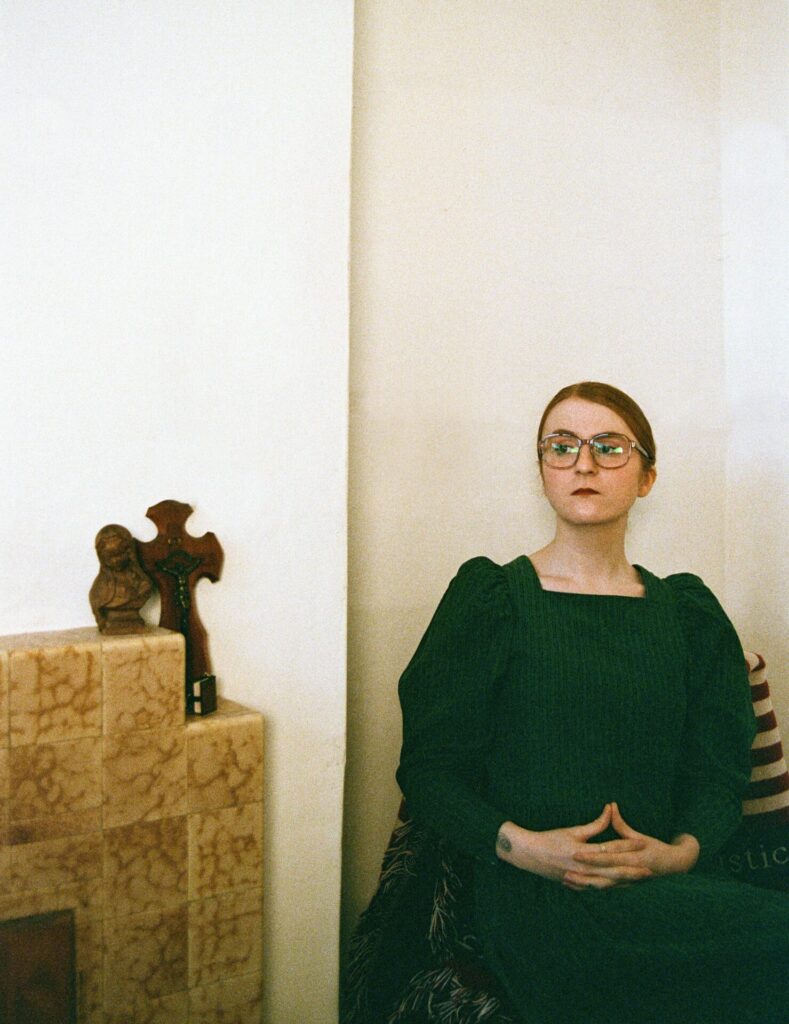
The album is purposefully woozy, stitching Walton’s memories into the shape of established myths. ‘Shelly’ sees Walton step further back into her personal lore for inspiration. “When I was 11, my mum’s boyfriend lived in Leeds, and we’d always do this two hour drive from Sunderland,” she recalls. “On one drive I was in the front seat and we hit a deer, and it was really, really gnarly. I saw it, but it was all a flash, and my recollection of it is quite hazy. The next day, we went to a weird, beaten-up mechanic’s place and this guy made a joke about how we’d killed Bambi, and I just broke down. My mum was like, what are you doing?!” The mechanic’s cruel joke makes it to the song’s lyrics, wrapped up with imagery of skinning animals, gas station perfume and cans full of petrol waiting to be lit – a creepy childhood story as “a jumping off point to fit into some tropes about the South.”
It also features a guest guitar part from Walton’s long-time friend and Microplastics collaborator aya, who also mixed the album. “Her doing the guitar on that first verse completely changed the momentum of things,” Walton says, running down the many roles aya played on the record: “Additional guitar player, mixer, vocal coach, champion… she was basically coaching me through it, which I needed because I’d been doing it for so long I’d lost any objective edge. But she really helped me to finish it and get it over the line. It felt really nice to keep it in the family.”
Speaking of family, another guest on the album is aya’s father Bob Lockwood, who plays double bass on ‘Miss America’ (“in so many ways it couldn’t have been anyone else”), joined by Shovel Dance Collective’s Daniel S. Evans on cello. On the stunning closing track ‘The Only Way Is Through’, Walton’s voice is enveloped by that of Aga Ujma; she is also joined vocally by Alex McKenzie, Joshua Barfoot and Nick Granata, also of Shovel Dance Collective. “As corny as it is like, I really wanted to make a song about giving up on control as the only way to get through grief,” she says of the song’s motivations. “Grief is so overwhelming that all that you can do is rely on other people and give yourself over to it. So I really liked to be supported at the end with the voices of my very talented friends.”
Walton performed Daughters solo at the ICA in early October (“It felt very visually singer-songwriter – I described it to the sound tech as ‘evil Arcade Fire’”) but will bring her coterie of friends and collaborators onstage for a full band album launch at The Old Church in Stoke Newington on 23 October. “I’d left it late and no venue would take it,” she explains. “Then of course, the one that is miraculously free is the only standing Elizabethan church in London.” Does bringing such a personal record out into the world feel difficult? “I feel quite relieved because I gave it everything I physically could,” Walton concludes. “Now I can step back from it and be happy with it. Making a grief album is hard and complicated and knotty, and grief is really weird and complicated and strange in ways I didn’t expect it to be. But I hope that the record speaks to these disparate things and how they overlap.”
Daughters by Jennifer Walton is released via Local Action on 24 October

